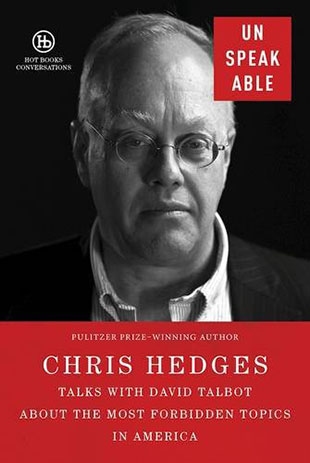Chris Hedges is a Pulitzer Prize-winning journalist, The New York Times bestselling author of Days of Destruction, Days of Revolt, War Is a Force That Gives Us Meaning (a finalist for the National Book Critic Circle Award for Nonfiction), and other books. He was a New York Times foreign correspondent for fifteen years, covering wars across the world. This zealous journalist is a public intellectual who has been scorned and marginalized by the media establishment and those in power in the military-industrial complex. Hedges has functioned as a prophet in his critiques of capitalism, consumerism, imperialism, and racism.
This hard-hitting and iconoclastic book is a conversation by Hedges with fellow radical journalist Dan Talbot, founder of Salon and Hot Books. The conversation with this independent thinker and activist is the first in the "Unspeakable" series from Hot Books. The intention is ambitious and challenging:
"We hope to lift the political conversation in America from the imbecilic and benighted depths to which it has sunk. We believe the public is ready for a discourse that assumes their intelligence and whets their appetite for taboo ideas. We all want to not only know how we got into our current abysmal predicament, but how we might crawl out."
To understand Hedges the man, it is helpful to learn about the boy, the son of a Presbyterian minister, who dictated stories for his mother to type when he was four or five; the youth who was a middle-class scholarship student at elite prep schools; the college student who was a Shakespeare actor; the young man who served an inner-city church in Boston; the graduate of the Harvard Divinity School; the war correspondent in Central America, the Middle-East, and the Balkans; the blunt and outspoken New York Times correspondent; and the radical journalist whose heroes are George Orwell, James Baldwin, and Noam Chomsky.
Talbot and Hedges cover some of the forbidden topics which are downplayed or never covered at all in the corporate media and the U.S. power structure such as:
- the inability of the Democratic Party (which is steeped with corruption ) to deliver the deep structural change needed in America;
- the desperate need to gain control over military spending;
- the dangers on the horizon emanating from the security and surveillance state which will make us "the most monitored and watched society in human history";
- the necessity to reach those middle-and-lower class people who are without hope, seething with hatred, enraged about the failures of the ruling elite, and filled with the romantic notion of making America great like it was in the past.
He further laments the criminalization of poverty, the omnipresence of pornography, and the madness of devoting 45 percent of the earth's land mass exclusively to raising livestock.
